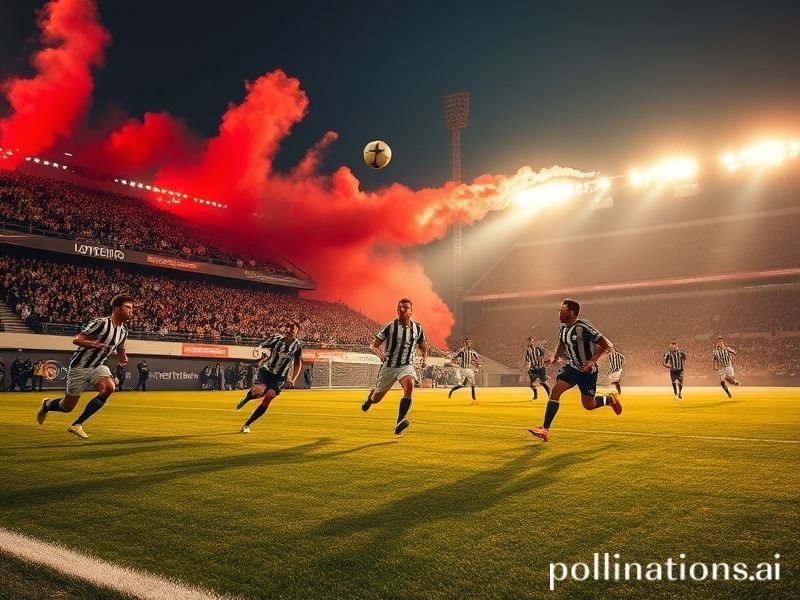Verona vs Juventus: How a Provincial Football Match Explains the Entire Collapsing World Order
Verona vs Juventus: A Microscopic Opera of Global Delusion
By Dave’s Locker International Desk
There is, at first glance, nothing cosmic about a mid-table scuffle in Serie A. Verona—city of star-crossed teenagers, overpriced opera tickets, and the faint smell of mildewed romance—hosts Juventus, that Turin-based global hedge fund that occasionally fields a football team. And yet, under the sanitised glare of Bentegodi’s floodlights, the fixture has quietly become a compact allegory for the planet’s current malaise: bloated oligarchs versus small-town dreamers, all soundtracked by the distant hum of geopolitical anxiety.
Kick-off is scheduled for 20:45 local time, which translates to 15:45 on Wall Street (right when VIX traders are debating whether Armageddon should be priced in before or after lunch), 03:45 the next morning in Beijing (where a bleary-eyed logistics manager streams the match on an illegal feed while worrying about U.S. export tariffs), and prime time in Lagos (where betting slips flutter like confetti at an underfunded wedding). In other words, this is not merely 22 men shepherding a sphere across grass; it is a planetary Rorschach test, and we are all failing it.
Juventus arrive carrying the accumulated baggage of a decade’s financial doping scandals, a botched European Super League putsch, and the sort of moral flexibility that would make a Swiss asset manager blush. Their travelling ultras wear limited-edition hoodies manufactured in Bangladeshi sweatshops, then resold online at 400 % mark-up to “authentic” fans in Jakarta. The club’s balance sheet is a Byzantine labyrinth of related-party sponsorships, creative amortisation, and the quiet prayer that nobody looks too closely at the Cayman Islands subsidiary. On the pitch, they field a squad whose combined transfer fees could refinance a medium-sized emerging-market debt crisis. Off it, they field a legal department that moonlights as an economic hit squad.
Verona, meanwhile, are the plucky underdog in the way a regional newspaper is plucky when it tries to investigate city hall while bleeding advertisers to Facebook. Their stadium is a concrete relic from an era when architects believed exposed rebar was chic. Their wage bill is roughly what Juventus spends annually on bespoke vitamin drips. Their ultras, a charming ensemble of local tradesmen and semiprofessional conspiracy theorists, have spent the week debating whether to protest soaring ticket prices or the alleged chem-trail patterns above the Dolomites. (Consensus: why not both?)
The referee is Portuguese, because UEFA’s commitment to continental integration apparently stops short of letting Italians officiate their own circuses. VAR is staffed by a pair of moonlighting IT technicians who, between freeze-frames, are answering Slack messages about overdue cloud-migration invoices. Every slow-motion replay is thus a gentle reminder that human judgement—like the global supply chain—works best when nobody inspects it too carefully.
On the pitch, the match itself unfolds like a graduate seminar in late-capitalist entropy. Juventus monopolise possession the way Amazon monopolises your browser history: relentlessly, clinically, and with the faint whiff of antitrust litigation. Verona counter-attack with the desperation of a gig-economy courier dodging traffic fines. At minute 37, a Juve midfielder pulls up clutching his hamstring; within seconds, a physio is administering what looks suspiciously like a proprietary blend of horse placenta and hope. Simultaneously, in a parallel universe, a hedge-fund algorithm has already hedged the player’s injury via a bespoke derivative indexed to his social-media sentiment score.
The second half brings the inevitable controversy: a penalty awarded after a VAR review that lasts just long enough for global crypto markets to dip three per cent on unrelated regulatory panic. Verona’s keeper saves the spot-kick, prompting rapturous scenes in the curva and a brief spike in regional wine sales. Alas, parity lasts only nine minutes; Juve score from a set-piece that involves more strategic blocking than a UN Security Council veto. Final score: 2-1 to the Bianconeri. The travelling fans sing about history, glory, and the inevitability of oligarchy. The Veronese mutter darkly about conspiracies and the price of diesel.
And so the world turns. Somewhere in Silicon Valley, a start-up founder watches the highlights and decides the real problem is insufficient NFT ticketing. In Moscow, a sanctions-hit oligarch sighs wistfully at Juve’s balance-sheet wizardry. In Buenos Aires, a fan sells a kidney to afford the new away kit. The match is over, the circus folds its tents, and the caravan limps on to the next city—because if there’s one thing humanity has mastered, it’s mistaking repetition for destiny.
Conclusion: Verona vs Juventus was never just football. It was a 90-minute masterclass in how the local becomes global, how the trivial becomes existential, and how, despite every rational alarm bell, we still queue up for the next ticket. The planet may be on fire, but at least the smoke machines at the stadium worked flawlessly. Priorities, dear reader, are the last thing we have left.







